Mountain marathons: what on earth? To the uninitiated, this might sound pretty daunting, and rather like the sort of event you never want to be involved in, but it is actually a very welcoming, fun sport with events suitable for a wide range of abilities. Even if you have never heard of it and this doesn’t sound too appealing, read on to find out a bit more about it and how you can get involved.
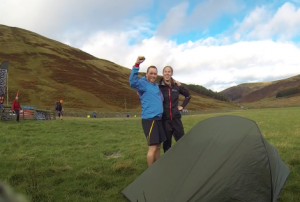 What is a Mountain Marathon?
What is a Mountain Marathon?
Essentially, this is a two-day running event with an overnight camp, but there are many different formats in existence, from 3 hour “mini” events to night-time only epics. Participants usually compete in teams of two, and must navigate their own way around an unmarked course in the hills or mountains of the UK within a set time limit, carrying everything they need for the two days, including all their camping gear. It is really important to pack carefully – a pack weighing more than 5kg quickly becomes a burden and will really slow you down. Elite competitors often carry less than 3kg apiece!
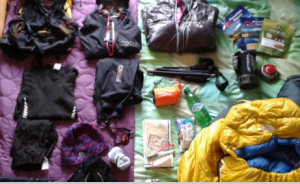
Packing becomes something of a logistical challenge!
What Skills Do I Need?
You need to be able to read a map and use a compass: however fit you are, there are heavy time penalties for being late, so good navigation skills are a must. You need to be fit enough to cope with two days running and walking in the hills on rough ground – a lot of your time will be spent nowhere near a path! Having said that, unless you fancy entering the “Elite” class, you really don’t need to be as super-fit as you might think: good hill-walking fitness and the ability to run a half marathon will do to start with. A bombproof sense of humour, the ability to pitch a tent in under thirty seconds in a howling gale and some culinary wizardry to help you turn a packet of freeze dried noodles into haute cuisine are desirable, but not essential.
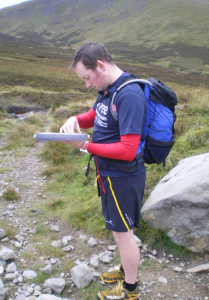
Decent shoes and rucksack will really improve your comfort and performance on the day.
What Kit Do I Need?
This is a trade-off between comfort and performance: the heavier your pack, the harder your days will be, but you might be more comfortable at camp. Whilst it is possible to spend a fortune on top-end, lightweight gear, you can hire much of the more expensive pieces, such as tents and sleeping bags, and certainly for a first try I would recommend borrowing as much as possible until you know if you enjoy it. Essential items where it is worth spending some money include a lightweight rucksack which doesn’t bounce as you run, fell running shoes with excellent grip and a full set of lightweight, breathable waterproofs (it will always rain).
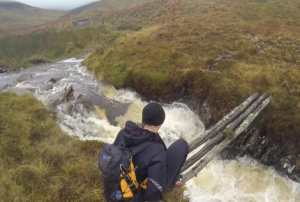
Courses have their own hazards and you decide what you can handle: we opted to find a safer crossing point!
Is it dangerous?
I guess that depends on your definition! Certainly you shouldn’t expect to see marshals out on course keeping an eye on you, the route is up to you and don’t expect anyone to send out for Mountain Rescue until you’re at least a day late arriving at the finish. In addition to all the obvious hazards (cliffs, bogs, fast flowing streams), you also have to consider exhaustion, hypothermia and a variety of exciting diseases such as Lyme Disease, leptospirosis, giardia… Despite this, accidents are rare: you should take responsibility for your own decisions, know your capabilities and work closely with your partner. It is actually very liberating NOT being surrounded by Health & Safety paranoia for a change.
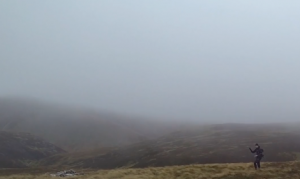
Navigation can be challenging…
Can I Give It a Try?
If you are keen to give it a try (and you really should), the best place to start is probably with an organised “Mini” event, such as the Dark and White Mini Mountain Marathon or the Original Mountain Marathon (OMM) Lite. These give you a chance to see how you find the format, without the added pressure of a long day and overnight camp. These events are great fun, very supportive and a fantastic way to get out into the countryside. Once you’re hooked, try signing up for a short score course at one of the UK-wide events: the score format gives you the most flexibility to tailor the route to how you feel on the day.
Visit the Mini Mountain Marathon website or Original Mountain Marathon events page for more information on how to get started. Get out and give it a go!
Thank you to Glenn Tait for the featured images.
By Nina Tomlin
Find out what it is like to study at The College of Animal Welfare
